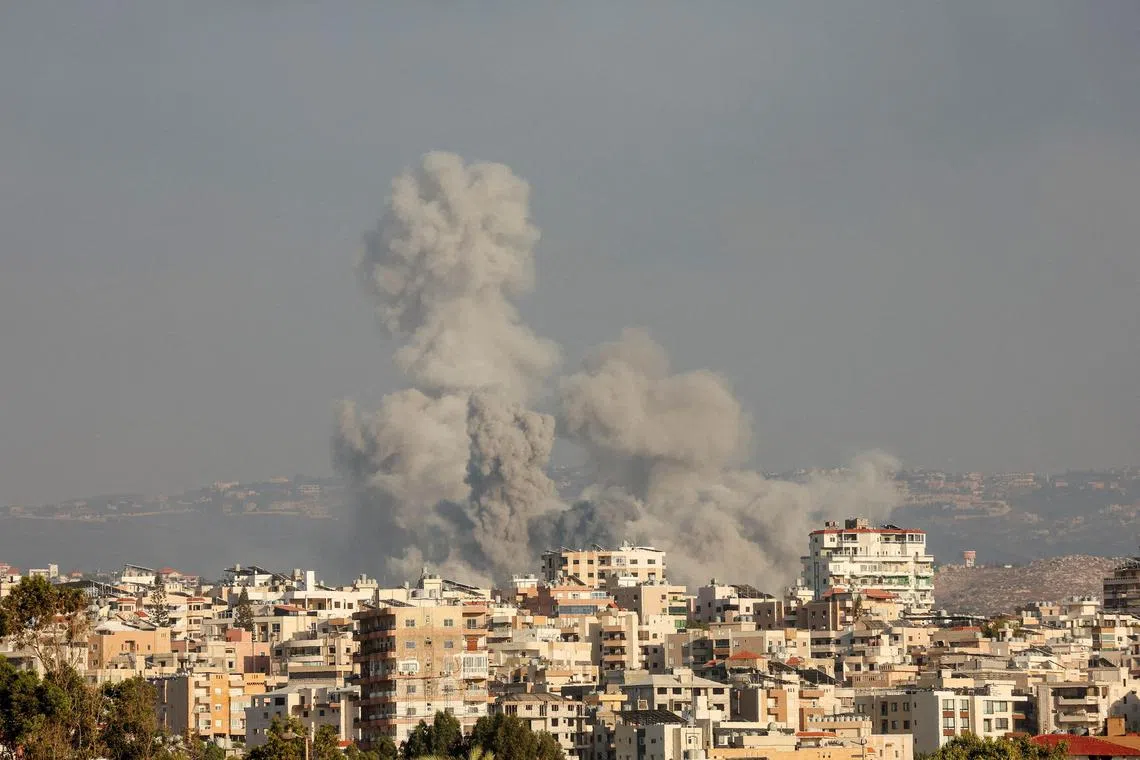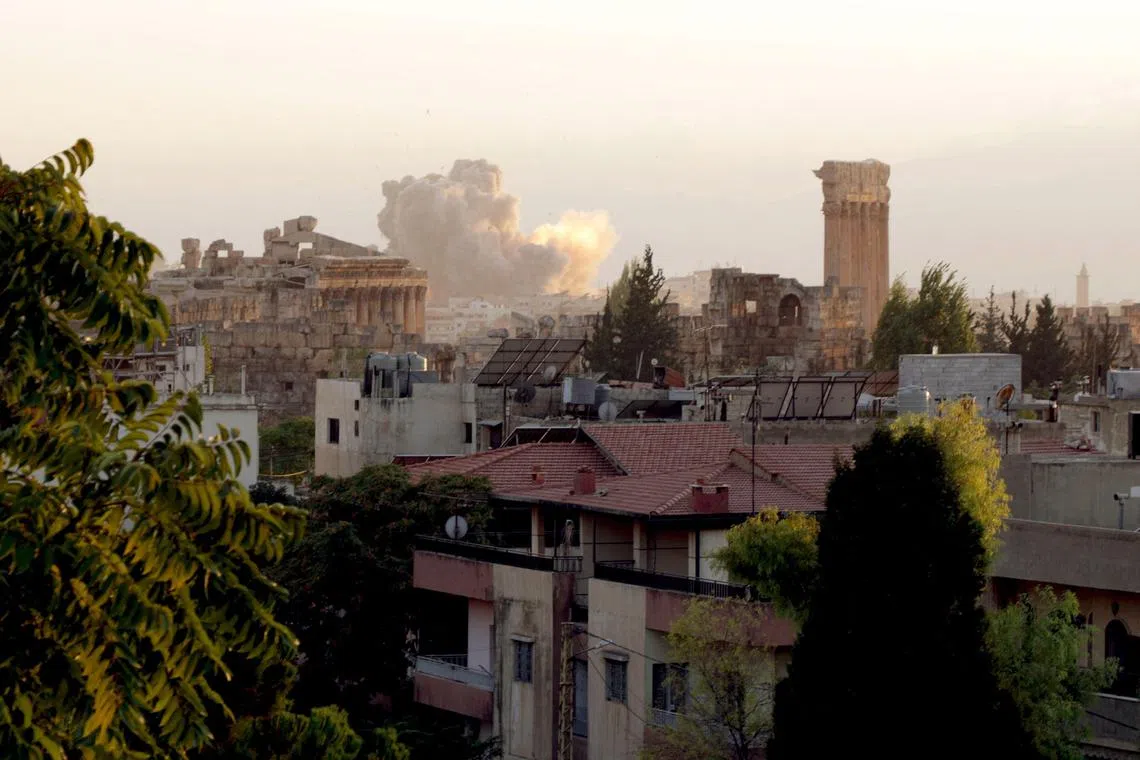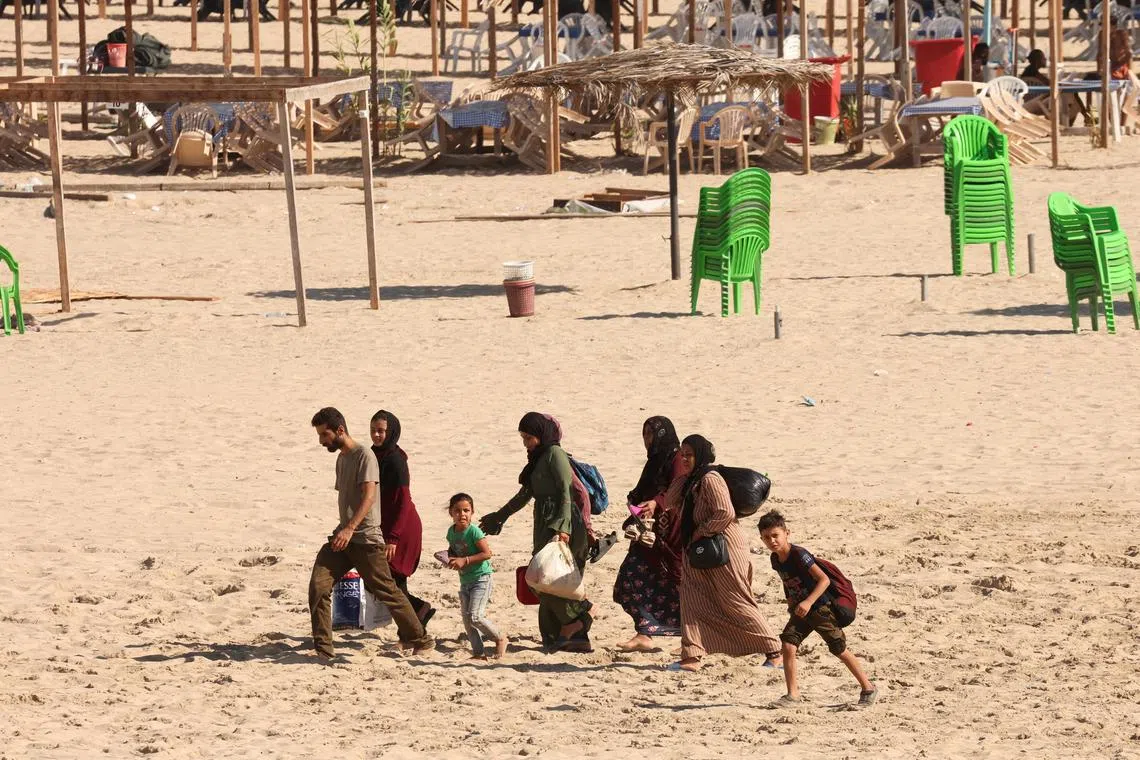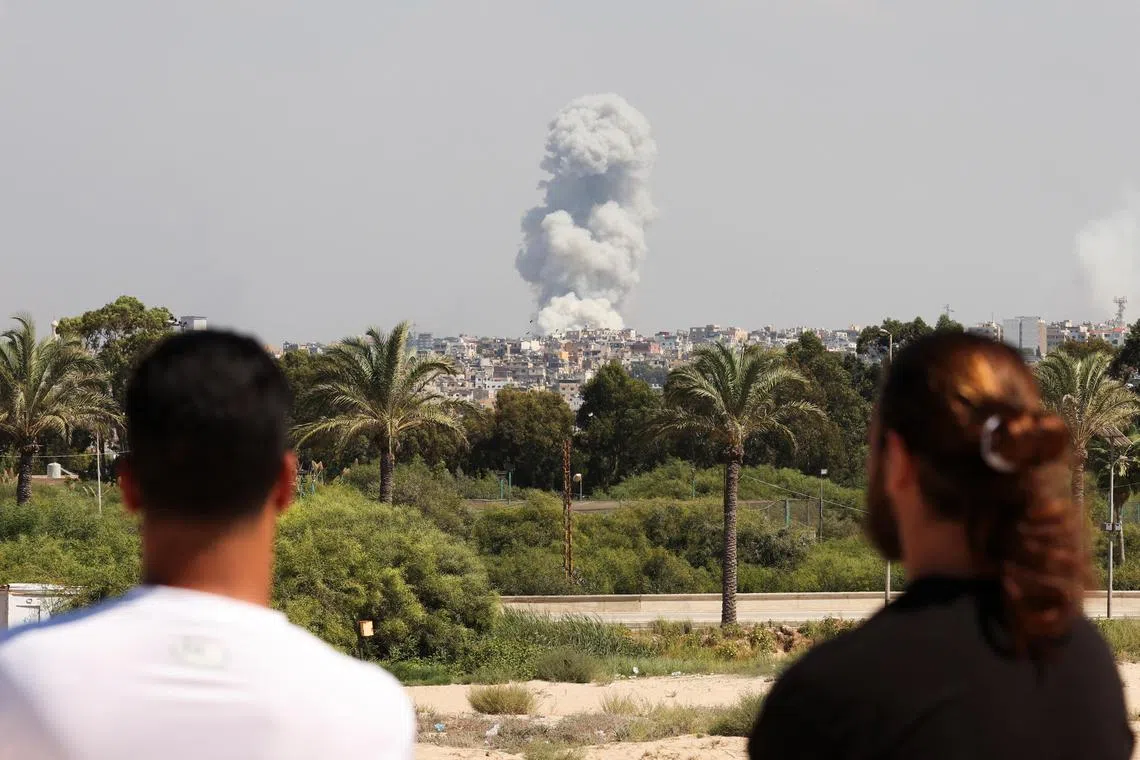Israel launches more strikes on Hezbollah as death toll in Lebanon rises to 558
Sign up now: Get ST's newsletters delivered to your inbox

Smoke rising amid ongoing cross-border hostilities between Hezbollah and Israeli forces in southern Lebanon on Sept 23.
PHOTO: REUTERS
Follow topic:
BEIRUT - Israel announced dozens of new air strikes on Hezbollah strongholds in Lebanon on Sept 24, a day after 558 people, including about 50 children, were killed in the deadliest bombardment since a devastating war in 2006.
“In the last hour, warplanes bombed Hezbollah targets in southern Lebanon, including missile launchers, military buildings and buildings where weapons were stored,” Lieutenant-Colonel Avichay Adraee, an Israeli army spokesman, said in a post on social media platform X on Sept 24.
A Lebanese security source said an Israeli strike hit Beirut’s southern suburbs on Sept 24, killing six people, including Ibrahim Qubaisi, a top Hezbollah commander who oversaw the deployment of missile batteries.
“An Israeli strike targeted two floors in a residential building in the Ghobeiri area,” the security source said, requesting anonymity to discuss sensitive matters.
The Israeli military said it killed a large number of militants when it hit about 1,600 suspected Hezbollah targets around Lebanon on Sept 23.
Hezbollah said, in response, that it launched volleys of missiles at Israeli military bases on Sept 24. It said 180 of its projectiles and an unmanned aerial vehicle crossed into Israeli airspace, sending people in the city of Haifa running for shelter.
The raids in Lebanon on Sept 23 also killed 94 women, according to Health Minister Firass Abiad. He said that the vast majority, if not all, of the 558 individuals killed in these attacks were unarmed people in their homes.

Smoke billowing from the site of an Israeli air strike on the Lebanese city of Baalbeck, in the Bekaa valley, on Sept 23.
PHOTO: AFP
The UN said tens of thousands of Lebanese have fled their homes since Sept 23, in the face of the intensifying Israeli bombardment.
“Tens of thousands of people were forced from their homes yesterday and overnight, and the numbers continue to grow,” UN refugee agency spokesman Matthew Saltmarsh said, adding that “the toll on civilians is unacceptable”.
“It was a day of terror,” 41-year-old housewife Thuraya Harb said, at a makeshift centre for displaced families in Beirut, after fleeing her home in south Lebanon.
“I didn’t want to leave my home, but the children were scared,” the mother of four said, adding that the family fled “with nothing but the clothes on our backs”.
The Sept 23 assault on Lebanon was by far the largest and deadliest, not just in the past year, but since the Israel-Hezbollah war in the summer of 2006.
That war saw 1,200 people killed in Lebanon, mostly civilians, and 160 Israeli deaths, most of them soldiers. Large swathes of Hezbollah strongholds were also devastated.
‘Operation Northern Arrows’
Israel has dubbed its raids on Hezbollah “Operation Northern Arrows” after announcing earlier in September that it was shifting the focus of its firepower from the Gaza Strip to Lebanon.
Long-time foes Hezbollah and Israel have been locked in near-daily cross-border exchanges of fire for almost a year, since the Palestinian militant group Hamas, which rules Gaza, staged an unprecedented attack on Israel on Oct 7, 2023
The Oct 7 attack resulted in the deaths of 1,205 people, mostly Israelis.
Israel’s retaliatory military offensive, meanwhile, has killed at least 41,467 people in Gaza.
Hezbollah backer Iran condemned the Sept 23 raids on Lebanon, with President Masoud Pezeshkian saying its ally “cannot stand alone” against Israel.
“Hezbollah cannot stand alone against a country that is being defended and supported and supplied by Western countries, by European countries and the US,” Mr Pezeshkian said in an interview with CNN.
“We must not allow Lebanon to become another Gaza at the hands of Israel,” he added.
Other leaders have expressed alarm over the rapid escalation, with UN chief Antonio Guterres’ spokesman saying he was “gravely alarmed”, and the EU’s top diplomat Josep Borrell warning “we are almost in a full-fledged war”.
The Pentagon said it was sending a small number of additional US military personnel to the Middle East after thousands were deployed earlier alongside warships, fighter jets and air defence systems.
A US official, speaking on condition of anonymity at the UN General Assembly, said Washington opposed an Israeli ground invasion targeting Hezbollah and had “concrete ideas” on how to de-escalate the crisis.
China’s top diplomat Wang Yi expressed support for Lebanon and condemned what he described as “indiscriminate attacks against civilians”.
‘Most difficult week for Hezbollah’
Israeli armed forces chief Herzi Halevi said the strikes on Sept 23 hit combat infrastructure Hezbollah has been building for two decades, while Defence Minister Yoav Gallant called it “a significant peak” in the operation.
“This is the most difficult week for Hezbollah since its establishment – the results speak for themselves,” he said.
Prime Minister Benjamin Netanyahu said Israel was acting to change the “security balance” in the north, while Hezbollah said it was in a “new phase” of confrontation with Israel.
The violence between Israel and Hezbollah escalated dramatically last week, when coordinated communications device blasts
Then on Sept 20, an Israeli strike on southern Beirut, a bastion of Hezbollah, killed its elite Radwan Force commander Ibrahim Aqil.
An Israeli military official, who cannot be further identified under military rules, said the operation seeks to “degrade threats” from Hezbollah, push them back from the border, and then destroy infrastructure.
“This is an extremely dangerous situation, but one that for me still leaves room for diplomacy to avoid the worst,” said Israeli political analyst Michael Horowitz.

People carrying belongings at a beach as they fled amid ongoing cross-border hostilities between Hezbollah and Israeli forces.
PHOTO: REUTERS
Global powers urged Israel and Hezbollah to step back from the brink of all-out war.
France and Egypt called on the UN Security Council to intervene, while Iraq requested an urgent meeting of Arab states on the sidelines of the UN General Assembly in New York.
Lebanese Prime Minister Najib Mikati urged the UN and world powers to deter what he called Israel’s “plan that aims to destroy Lebanese villages and towns”.
‘Full-fledged war’ nearing
US President Joe Biden, whose country is Israel’s main ally and weapons supplier, said Washington was “working to de-escalate in a way that allows people to return home safely”.
Group of 7 foreign ministers said in a joint statement that “no country stands to gain” from escalating conflict, warning of “unimaginable consequences” if a regional war broke out.

People watching as smoke billowed over southern Lebanon following Israeli strikes, amid ongoing cross-border hostilities between Hezbollah and Israeli forces.
PHOTO: REUTERS
The UN peacekeeping force in south Lebanon warned “any further escalation of this dangerous situation could have far-reaching and devastating consequences”.
Qatar, a mediator in Gaza ceasefire talks, said Israel’s bombardment of Lebanon “puts the region on the brink of the abyss”, while Turkey said the strikes threatened “chaos” and Jordan urged an immediate end to the escalation “before it is too late”.
The Palestinian Foreign Ministry condemned the strikes and ordered Palestinian medical staff in Lebanon to provide support for the wounded. AFP

